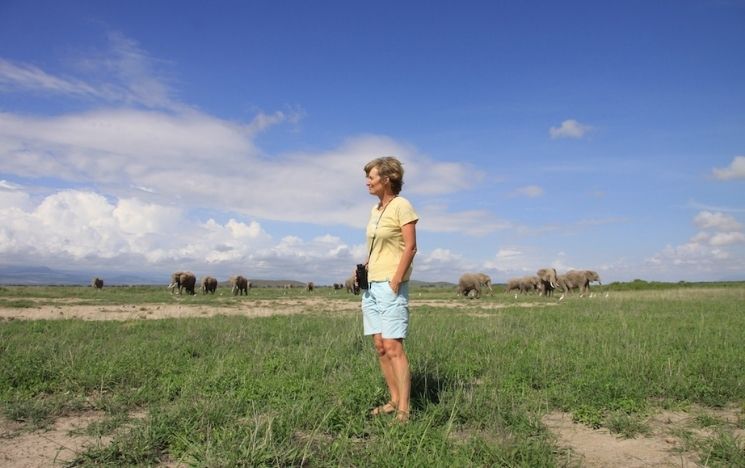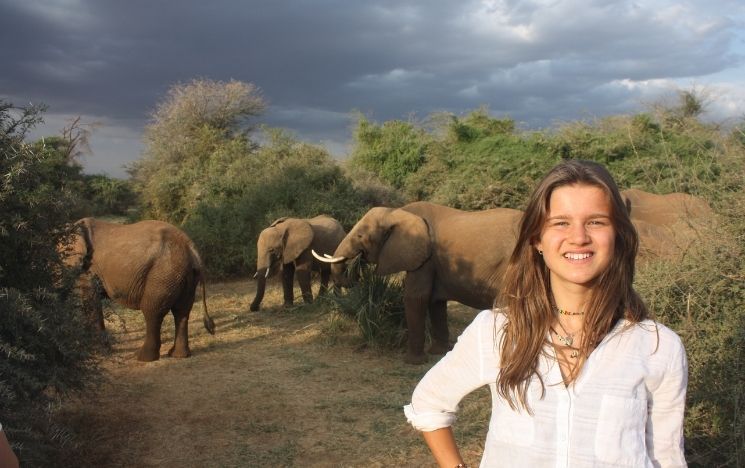Elephants: social and cultural knowledge
Our research has shown that like humans, elephants have extensive social knowledge, and older female leaders act as repositories of both social and ecological information for their family groups. Current studies are investigating cultural differences between elephant populations and the role of cultural knowledge in female decision-making.
Long-term research on elephant communication and cognitive abilities

Karen McComb’s research on elephant communication and cognition spans more than 25 years, and she has worked closely with key collaborators including Graeme Shannon, Cynthia Moss, Sarah Durant, Joyce Poole and Rob Slotow.
Her research has focused primarily on using playback experiments to study social knowledge in African elephants, demonstrating the vital role of older matriarchs as repositories of both social and ecological information for their family groups.
Recent findings show that social disruption has very significant negative effects on knowledge acquisition in elephant families and that elephants can determine ethnicity, gender, and age from acoustic cues in human voices.
As well as extensive media coverage including on ITV News at Ten and the Radio 4 Today programme, this work has featured in the BBC documentary ‘Inside the Animal Mind’.
Cultural variation in elephant populations

Lucy Bates, Karen McComb and their collaborators are currently conducting a survey of elephant research projects across Africa to determine if inter-population differences in social behaviour provide evidence for the existence of cultural variation.
Many animals learn socially and exhibit traditions, often in single behavioural traits. Fewer species – most notably the large-brained, long-lived and highly social great apes and cetaceans – are so far known to exhibit multiple traditions in customary patterns, such that each population has a signature behavioural repertoire, or its own ‘culture’.
Like great apes and cetaceans, African elephants also have large brains, long life spans, and extensive social networks, raising the possibility that they too may exhibit distinct, learned cultural repertoires. However, despite widespread assumptions about the importance of socially acquired knowledge in elephant society, to date, no one has systematically investigated the role of culture in elephant behaviour.
Our ongoing project thus aims to explore for the first time the role of cultural inheritance in elephants.
Matriarch decisions: role of experience & inherited cultural knowledge

Jemima Scrase is conducting a PhD on matriarchal leadership in African elephants. Specifically, she is interested in decision-making and the dual roles of individual experience and inherited cultural knowledge from predecessor matriarchs.
Using a combination of experimental and observational methods, and analysing existing long-term datasets, she plans to investigate matriarchal take-overs and the subsequent role of experience in matriarchs’ effectiveness as leaders which manifests itself in leadership decisions and appropriate group co-ordination.
Working in collaboration with Save the Elephants, Jemima will conduct her fieldwork in the Samburu-Laikipia region of Kenya. Understanding the value of leadership and the importance of social learning within elephant societies will enhance our understanding of the vulnerability of the matriarchal system.
The loss of a matriarch, or the establishment of a young and inexperienced matriarch, may have far-reaching consequences. This is highly relevant because:
- matriarchs suffer selective removal at the behest of the ivory trade due to their larger size
- rapidly changing environments manifest in novel challenges which may demand effective leadership for elephant survival and reproduction.